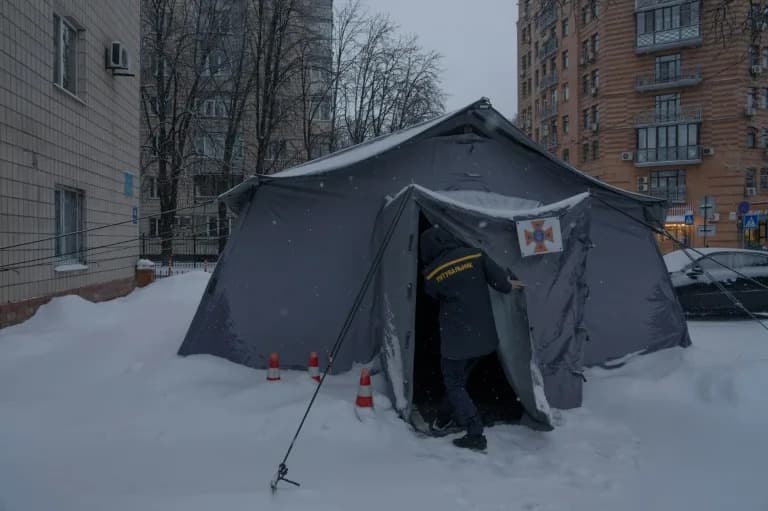Ukrainian strikes temporarily cut power and heating in parts of Voronezh and damaged systems serving Belgorod, leaving about 20,000 households without service; Taganrog also suffered hours-long blackouts. Moscow said it intercepted dozens of drones overnight but did not address all affected provinces. Ukraine accused Russia of deliberately endangering nuclear safety after strikes hit substations that feed the Khmelnytskyi and Rivne nuclear plants and requested an urgent IAEA meeting. Kremlin officials said they will study plans to review nuclear testing but insisted Russia remains committed to the global test ban.
Ukrainian Strikes Cut Power and Heating to Voronezh and Belgorod; Kyiv Warns of Nuclear Risks

Ukrainian strikes disrupt power and heating in two Russian border cities
Ukrainian strikes briefly knocked out electricity and heating to parts of Voronezh and caused major damage to systems serving Belgorod, Russian regional officials said Sunday. The incidents come amid near-daily assaults on energy infrastructure on both sides and stalled U.S.-led diplomatic efforts to end the nearly four-year war.
Power outages and damage
In Voronezh, which has a population of just over 1 million, regional Governor Alexander Gusev reported that a drone strike caused localized blackouts and interrupted heating in parts of the city. He said several drones were electronically jammed overnight and that a fire at a local utility facility was quickly extinguished. Russian and Ukrainian Telegram channels reported the strike targeted a nearby thermal power plant.
Late Saturday, a missile strike inflicted what Belgorod regional Governor Vyacheslav Gladkov described as “serious damage” to power and heating infrastructure serving the city of Belgorod, leaving about 20,000 households without service, his office said Sunday morning.
Authorities in the Rostov region also reported hours-long blackouts in Taganrog, a city of roughly 240,000, following an emergency shutdown of a power line; local media reported a nearby transformer substation caught fire.
Drone interceptions and cross-border activity
Moscow’s Defense Ministry said its forces destroyed or intercepted 44 Ukrainian drones overnight that flew over the Bryansk and Rostov regions, but the statement did not mention Voronezh or Belgorod provinces and did not disclose how many drones were launched.
For months, Ukraine has carried out long-range strikes on Russian fuel infrastructure to reduce Moscow’s oil export revenues. Kyiv and Western allies say Russia has been targeting Ukraine’s power grid to deny civilians heat, light and running water for a fourth consecutive winter — a tactic Ukrainian officials call the “weaponization of winter.”
Concerns about nuclear safety
Ukraine’s foreign minister, Andrii Sybiha, accused Russia of deliberately endangering nuclear safety after a large Russian drone-and-missile barrage on Friday struck power substations that supply two Ukrainian nuclear power plants. Sybiha said the strikes hit substations serving the Khmelnytskyi and Rivne nuclear stations and called for an urgent meeting of the International Atomic Energy Agency’s board of governors.
“These were not accidental but well-planned strikes. Russia is deliberately endangering nuclear safety in Europe,” Sybiha said in a statement.
Ukrainian and Western scrutiny has focused on last winter’s widespread damage to Ukraine’s electricity infrastructure and on whether Ukrainian authorities had adequately protected critical energy facilities near nuclear sites, several current and former officials told the AP.
Moscow’s response and nuclear testing debate
In Moscow, the foreign ministry and state media said work has begun to prepare plans at President Vladimir Putin’s direction to study the possibility of resuming nuclear tests. Kremlin spokesman Dmitry Peskov, however, told reporters that Russia intends to honor its obligations under the global nuclear test ban and that Russia has no current plan to resume nuclear-weapons testing; the country has not tested nuclear weapons since 1990.
The exchange followed comments by U.S. President Donald Trump that appeared to suggest Washington might consider restarting atomic tests, and after Russia unveiled new strategic systems including a nuclear-capable underwater drone and a nuclear-powered cruise missile — though Moscow has not announced any nuclear-weapons tests.
Diplomatic signals
Russian Foreign Minister Sergey Lavrov said he is ready to meet with U.S. Secretary of State Marco Rubio to discuss the war and bilateral ties, reiterating that Moscow believes any peace must take Russian interests into account. The remark echoed Kremlin positions emphasizing firm demands in negotiations over Ukraine.
All facts and quotes are taken from regional official statements and reporting attributed to Russian and Ukrainian sources and the AP.
Help us improve.


































